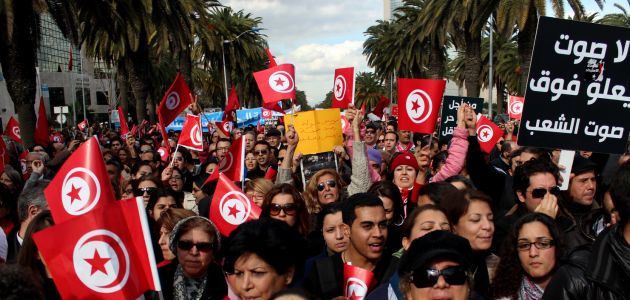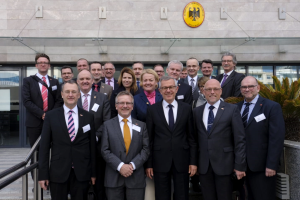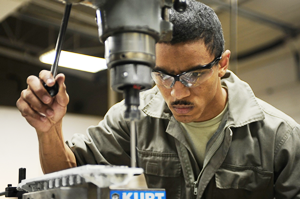The second station of the 2019 Course for Senior Officials was Tunis. In Tunisia the Course witnessed many democratic accomplishments, but also several fields in which Tunisia's democracy could still be fostered by increased cooperation.

Tunisia is often called the starting point of the 2011 Arab Spring. The picture shows street protests in early 2012. Picture: Amine GHRABI/Flickr/CC BY-NC 2.0
A one-hour flight from "the white seaside city" of Algiers brought the Course for Senior Officials to Tunis. In 2011, Tunisia was the starting point of the "Arab Spring" which led to groundbreaking changes that can be felt in Tunis until today. Through pressure from the street, then-president Ben Ali left the country while the military and national elites waited and restrained themselves. Eventually elections proved to be a consensual way out of the uncertain situation, leading to the end of the oppressive regime and giving birth to democracy.

Germany's Ambassador Dr Andreas Reinicke (m.) welcomed the Senior Course to Tunisia.
Picture: BAKS/Weigel
In Tunis the Seminar held intensive talks with several experts and decision-makers. A particularly impressive experience were the discussions with members of parliament, including both parties from the government and the opposition. At the Parliament's Committee of Foreign Affais, the Course met numerous women who expressed very clear-cut ideas about the future of their country. The most salient issue remaining is economic and political stability - a wish that already dominated Tunisia's transition to democracy.
Compared to other North African states, Tunisia has a rather small territory and does not have significant natural resources. Water supply remains a huge challenge. Business development is considered key to support the young democracy, and many national and European organizations are active in the field. Here, Tunisia benefits from equal rights for men and women which were already quite advanced before the revolution. Yet, there is also some latent uproar in society, like on of the dialogue partners said. It seems that time is running up, as especially the younger generations of Tunisia call for tangible progress.
Illegal Migration is Not an Issue
However, change needs time. Instead of efficiency, government-run companies focus on the prevention of unemployment, and the oversized administration does the same thing. Yet, a lot of economic potentials exist, especially in the agrarian and textile sectors. Naturally, the armed services exhibit a particulary high degree of inertia, leading to an urgent need for reforms in the security sector.

On of the topics discussed in Tunis were temporary visa for training and education in Europe.
Picture: Pixabay/CC0
Illegal Migration was not an issue. Neither does Tunisia regard itself a transit country, nor a country of origin for considerable migration numbers. Draconian punishments, including death penalty - which is still applicable but has not been executed for ten years - contribute to this. Tunisians mainly envisage legal ways to Europe, many of them with a return perspective from the outset. Temporary visa for training or education over a limited period of time could offer such perspectives.
A major finding of the Course was that democracy in Tunisia is still in its infancy but also exhibits powerful radiance. Well-balanced and multi-layered support can definitely foster Tunisia's democracy, while idleness might endanger the entire process and cause unforeseeable consequences.
Libya: Militias instead of the Monopoly of Force
During the Tunisian station the Course also addressed the situation in Libya and met representatives from the German Embassy for Libya (currently redeployed to Tunis), a member of the UN mission to Libya UNSMIL, as well as representatives from civil society and from the European Union's representation. The well-balanced look at least shed some light on the otherwise confounding situation in the country. However, optimism could hardly be found, as sober assessments dominated the anaylsis of a situation shaped by a lot of uncertainty.
The political process has come to a halt, although some progress might have been achieved recently. The situation is shaped by conflict over Libya's natural resources. Political agreement is not only impeded by armed groups controlling different parts of the country but also by external actors with partially conflictive interests. The most prominent danger is a fragmentation of the country. Hence the primary goal is to foster a state monopoly of force. Germany's efforts focus on strenghtening Libyan institutions. However, that is still a long way to go, and the situation in Libya remains critical.
Authors: Peter Härle and Jan Grebe
